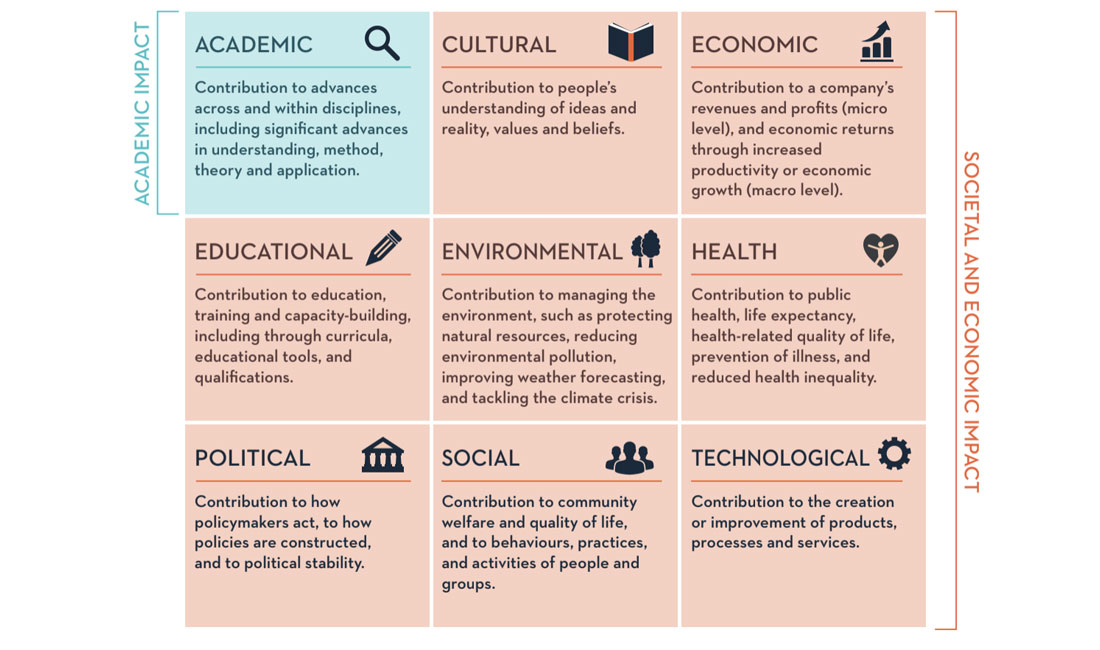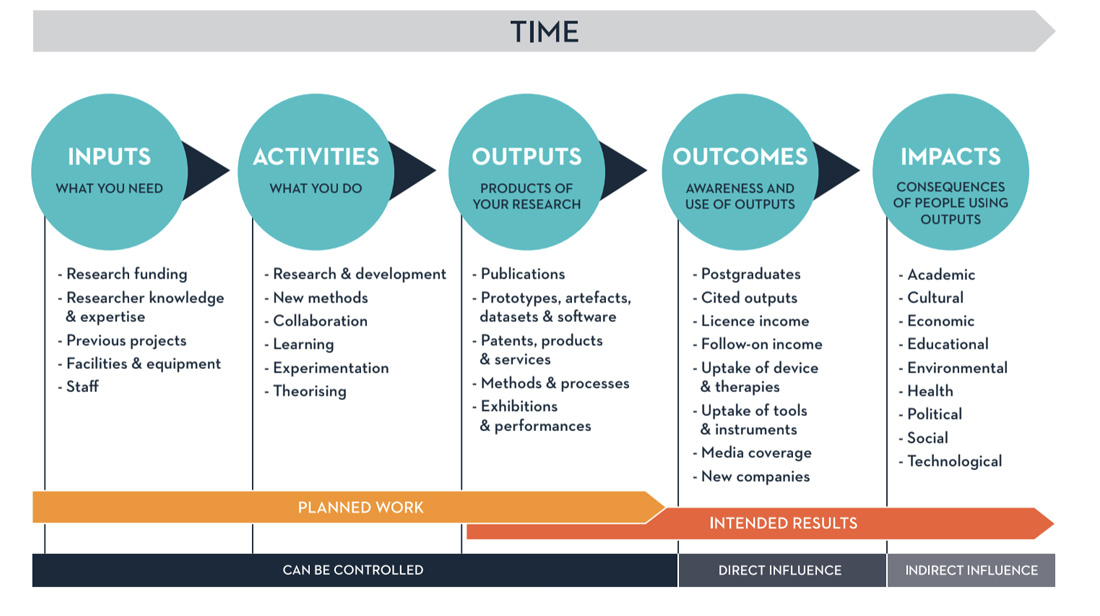
What is Impact?
The challenge
To plan, capture, communicate and monitor impact, you need to think systematically about the various ways people can benefit from your work. This is more important than ever, as major funding bodies around the world now consider impact a fundamental aspect of almost all research programmes.
But impact is complex. Although the impact of some research is apparent straight away, in other cases it can take years, or even decades, for impact to become evident. And this impact may be the result of hundreds of factors, of which your research is just one.
On top of that, research can affect all aspects of society, from culture to policy to the environment. A single research project can have impact in many different areas, and one impact may have knock-on effects elsewhere in society.
These distant time horizons and tangled pathways can make it incredibly difficult to consider impact. However, it is important that you do what you can to direct your research toward positive impacts – while mitigating negative impacts – and we have developed various supports and resources to help you. Watch our introductory video below:
While impact can be a tricky concept to get your head around, it doesn't need to be an additional burden. We know academics are already exceedingly busy with research, teaching, admin, and a thousand other things. You are not expected to spend hours every week meticulously planning and tracking your impact.
The tools on this website are designed to help you save time. By working no harder than you already do, we believe you can drastically increase the impact arising from your research. For us, impact is about creating opportunities to make a difference, and celebrating positive change when it occurs.
Defining impact
Broadly speaking, the impact of research can be academic or societal. That is, it can occur within academia or beyond it. For the most part, when people talk about research impact, they are using the term as a shorthand for those impacts on wider society.

We recognise that impact has academic, societal and economic elements, defined as follows:
Academic impact is the demonstrable contribution that excellent research makes to academic advances, across and within disciplines, including significant advances in understanding, method, theory and application.
Societal and economic impact is the demonstrable contribution that excellent research makes to society and the economy, of benefit to individuals, organisations and nations.
This is a broad definition – research can contribute to society in countless ways. Our classification system of different subtypes of impact (below) attempts to reflect this rich variety. It is based on a taxonomy developed by the European Science Foundation. Most research projects will have impacts in multiple areas.

The impact journey – untangling the terminology
The impact journey describes how research can lead to impacts on society (and academia). It traces research over time, distinguishing between five different stages on the pathway to impact:
- Inputs: What researchers need.
- Activities: What researchers do.
- Outputs: The products of research.
- Outcomes: People becoming aware of, and using, these products. They generally occur in the short- to medium-term.
- Impacts: Changes in society that result from outputs and outcomes. Typically, impacts occur in the longer-term.
The diagram below demonstrates this pathway, with examples under each of the five stages.

For more information on the impact journey, including concrete examples, click here.
What impact is made of
Impact is made up of two things: reach and significance. The biggest impact has both, but one or the other can still be meaningful.
Reach refers to how widespread the impact is, or how many beneficiaries there are.
Significance refers to how important or valuable the impact is to each beneficiary.
So, saving a life is profoundly significant at a small scale. Slightly enriching a million lives has substantial reach but less significance. Ideally, reach and significance will be considered relative to the academic disciplines and the scope of the research.
In summary
Impact is a change in the world which results from research. For example, this could be:
- Influencing policy
- Changing public opinion or informing debate
- Generating income or enabling savings to be made
- Improving systems, designs, or processes
- Enriching people’s cultural lives
Impact is not the underlying activities that aim to effect these changes. However, these are often a crucial part of the impact journey, and it is still important to think and talk about them. Examples include:
- Publishing academic papers
- Discussing one's research in the media
- Coordinating public engagement activities
- Generating interest in research via social media
- Presenting at conferences
To learn more about impact, consider watching this excellent (opens in a new window)nine-part video series created for NUI Galway by Saskia Walcott, an impact consultant based in the UK.
Explore our toolkit now to learn how to plan, capture, communicate and monitor your impact. The toolkit is made up of the resources and information found across this website, and you can explore it using the tabs at the top of the page.
